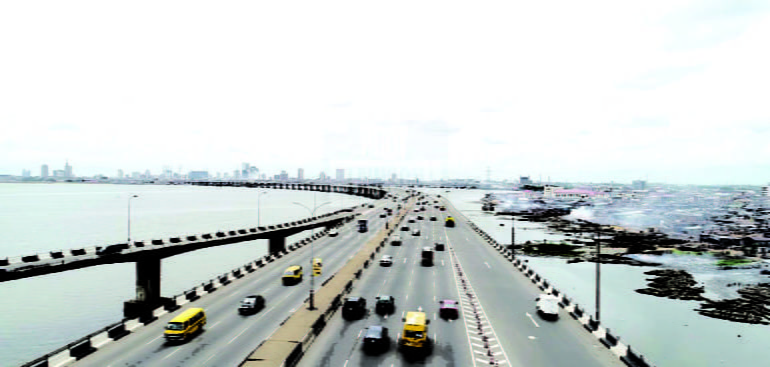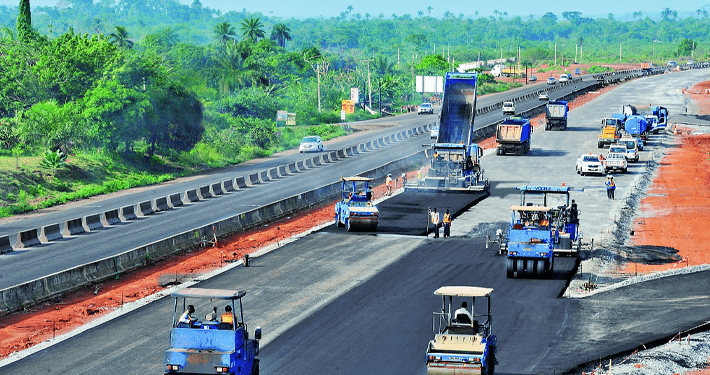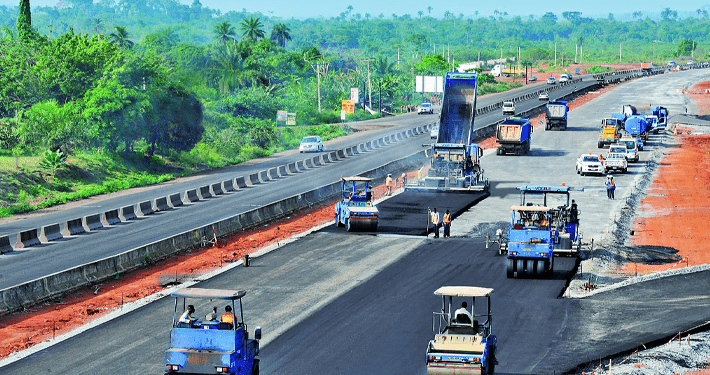

Ultimate Guide: Mastering the Legal Aspects of Bridge and Highway Construction in Nigeria
Introduction
In Nigeria, the development of bridges and highways is crucial for fostering economic growth, enhancing connectivity, and improving transportation infrastructure. However, constructing such essential infrastructure requires navigating a complex legal and regulatory framework. Understanding the legal aspects of bridge and highway construction in Nigeria is vital for ensuring compliance, mitigating risks, and achieving successful project outcomes. This article delves into the key legal considerations, challenges, and best practices for bridge and highway construction in Nigeria.
In a rapidly developing country like Nigeria, infrastructure development remains a cornerstone of economic growth, urban expansion, and national integration. One of the most crucial aspects of this development is the construction of bridges and highways—arteries that connect remote communities, facilitate the movement of goods and services, and improve the quality of life for millions of Nigerians. However, the journey from blueprint to pavement is far from straightforward. It traverses a highly intricate legal terrain, shaped by statutory provisions, regulatory agencies, environmental protocols, and public-private partnerships.
The Legal Aspects of Bridge and Highway Construction in Nigeria are not merely a backdrop to engineering feats; they are dynamic instruments that shape the success, sustainability, and legality of every construction project. The country’s legal and regulatory framework serves as both a guide and a gatekeeper, defining the parameters within which developers, government agencies, and contractors must operate. In a landscape where land use, environmental sustainability, project financing, and procurement are heavily legislated, understanding and navigating these laws is essential for every stakeholder.
With an ever-increasing demand for robust transportation networks and international interest in Nigerian infrastructure projects, the pressure to align with global best practices and local regulatory requirements has never been more intense. Investors and developers alike must ensure full compliance to avoid the delays, litigation, and financial losses that commonly plague construction projects. At the same time, public authorities are tasked with upholding transparency, accountability, and value-for-money principles in awarding and managing road and bridge contracts.
This article aims to provide a comprehensive overview of the legal dimensions underpinning bridge and highway construction in Nigeria. It explores relevant legislation such as the Land Use Act, Public Procurement Act, Federal Highways Act, and the Environmental Impact Assessment Act. It also examines the role of key government agencies such as the Federal Ministry of Works and Housing, the Bureau of Public Procurement (BPP), and the National Environmental Standards and Regulations Enforcement Agency (NESREA). Furthermore, we will delve into case law precedents, dispute resolution mechanisms, and recent developments that illustrate the real-life implications of regulatory decisions on major projects.
For construction firms and legal practitioners, this knowledge is more than academic. It is the bedrock of effective risk management, sound project planning, and successful execution. For government agencies and policy makers, it provides a critical lens through which to assess gaps, reforms, and policy improvements. For investors and international partners, it demystifies the procedural and legal bottlenecks associated with infrastructure investment in Nigeria.
The purpose of this article is twofold: first, to clarify the legal maze that often clouds bridge and highway projects in Nigeria, and second, to equip readers with actionable insights that ensure compliance, mitigate legal risk, and promote smoother project delivery. By identifying both opportunities and obstacles within Nigeria’s legal framework, this piece offers a holistic understanding of what it takes to turn infrastructure plans into reality—legally and efficiently.
In what follows, we shall examine the legislative context of infrastructure law in Nigeria, highlight the role of environmental and social impact assessments, break down the legal components of public-private partnerships (PPPs), and dissect landmark court cases that have shaped the current legal landscape. Ultimately, this article is an indispensable resource for legal professionals, civil engineers, policymakers, and business executives involved in the development of Nigeria’s vital transport infrastructure.
The Importance of Bridges and Highways in Nigeria
1. Economic Growth and Development
– Overview:
Bridges and highways are critical for facilitating trade, commerce, and mobility within Nigeria. They connect urban and rural areas, supporting economic activities and regional integration.
– Impact:
Efficient transportation networks enhance market access, reduce travel time, and contribute to economic development.
2. Safety and Infrastructure Improvement
– Overview:
Well-constructed bridges and highways improve road safety and reduce traffic congestion, addressing transportation challenges in Nigeria’s rapidly growing cities.
– Impact:
Enhanced infrastructure contributes to the overall quality of life and supports sustainable urban development.
Key Legal Aspects of Bridge and Highway Construction in Nigeria
1. Regulatory Framework and Compliance
– Overview:
The regulatory framework for bridge and highway construction in Nigeria involves various laws, regulations, and standards that govern project planning, design, and execution.
– Key Regulations:
- Federal Highway Act: Governs the construction, maintenance, and management of federal highways, including the approval process and standards for construction.
- Urban and Regional Planning Act: Regulates land use planning and zoning, impacting the location and design of highways and bridges.
– Environmental Impact Assessment (EIA) Act: Requires assessment of the environmental impact of construction projects, including highways and bridges.
2. Land Acquisition and Property Rights
– Overview:
Securing land for bridge and highway construction involves acquiring property rights and addressing legal issues related to land ownership and compensation.
– Legal Considerations:
- Land Use Act: Regulates land acquisition, ownership, and use, impacting the process of obtaining land for infrastructure projects.
- Compensation and Resettlement: Ensure fair compensation and resettlement for affected landowners and communities in accordance with legal requirements.
3. Zoning and Planning Approvals
– Overview:
Zoning and planning approvals are essential for ensuring that bridge and highway projects comply with local regulations and land use plans.
– Legal Considerations:
- Zoning Laws: Comply with zoning regulations that specify land use and development standards for infrastructure projects.
- Planning Approvals: Obtain necessary approvals from local planning authorities and adhere to land use plans and development guidelines.
4. Environmental Regulations and Compliance
– Overview:
Environmental regulations play a crucial role in minimizing the impact of bridge and highway construction on the environment.
– Legal Considerations:
- Environmental Impact Assessment (EIA): Conduct EIA to assess and mitigate the environmental impact of construction activities, including effects on ecosystems, air quality, and water resources.
- Environmental Protection Agency (EPA) Regulations: Comply with EPA regulations regarding waste management, pollution control, and environmental conservation.
5. Health and Safety Regulations
– Overview:
Adhering to health and safety regulations is essential for protecting workers, the public, and the environment during construction.
– Legal Considerations:
- Occupational Health and Safety Act: Implement safety measures to protect construction workers from hazards and ensure compliance with health and safety standards.
- Public Safety: Address safety concerns related to construction activities, such as traffic management, site security, and public awareness.
6. Construction Standards and Quality Assurance
– Overview:
Ensuring compliance with construction standards and quality assurance measures is crucial for the safety and durability of bridges and highways.
– Legal Considerations:
- Building Codes and Standards: Follow national and international building codes and standards that govern the design, construction, and maintenance of infrastructure projects.
- Quality Control: Implement quality control procedures and inspections to ensure that construction meets specified standards and requirements.
7. Contractual and Dispute Resolution
– Overview:
Effective contract management and dispute resolution mechanisms are essential for addressing issues that arise during construction.
– Legal Considerations:
- Contractual Agreements: Draft clear and comprehensive contracts that outline project scope, timelines, responsibilities, and dispute resolution procedures.
- Dispute Resolution: Establish mechanisms for resolving disputes, such as arbitration or mediation, to address conflicts between parties involved in the project.
8. Public-Private Partnerships (PPPs)
– Overview:
Public-private partnerships (PPPs) are increasingly used to finance and manage infrastructure projects, including bridges and highways.
– Legal Considerations:
- PPP Agreements: Negotiate and draft PPP agreements that define the roles, responsibilities, and financial arrangements between public and private stakeholders.
- Regulatory Compliance: Ensure that PPP projects comply with relevant regulations and receive necessary approvals from government agencies.
Challenges in Bridge and Highway Construction in Nigeria
1. Bureaucratic Hurdles
– Overview:
Navigating the regulatory landscape can involve bureaucratic challenges and delays, impacting project timelines and costs.
– Impact:
Streamlining regulatory processes and reducing bureaucratic red tape can improve project efficiency and reduce delays.
2. Infrastructure Funding and Financing
– Overview:
Securing adequate funding for large-scale infrastructure projects can be challenging, particularly in the context of limited public resources.
– Impact:
Exploring alternative financing options, such as PPPs and international funding, can help address funding challenges and support project implementation.
3. Land Acquisition Issues
– Overview:
Land acquisition for bridge and highway projects can be complex due to disputes, compensation issues, and resistance from landowners.
– Impact:
Effective land acquisition strategies and transparent compensation processes can mitigate challenges and facilitate project development.
4. Environmental and Social Impacts
– Overview:
Addressing environmental and social impacts is crucial for minimizing negative effects and ensuring sustainable development.
– Impact:
Implementing comprehensive environmental management plans and engaging with affected communities can help address environmental and social challenges.
Best Practices for Managing Legal Aspects of Bridge and Highway Construction
1. Engage Legal and Regulatory Experts
– Overview:
Collaborating with legal and regulatory experts is essential for navigating complex regulations and ensuring compliance.
– Implementation:
Work with legal professionals who specialize in construction law, land acquisition, and environmental regulations to address legal issues effectively.
2. Conduct Thorough Due Diligence
– Overview:
Perform comprehensive due diligence to identify and address potential legal and regulatory issues before initiating construction.
– Implementation:
Review regulatory requirements, land titles, environmental assessments, and construction standards to ensure all legal considerations are met.
3. Foster Collaboration with Authorities
– Overview:
Engaging with local and national authorities can streamline the approval process and address regulatory requirements.
– Implementation:
Maintain open communication with relevant authorities, attend public hearings, and seek feedback to ensure compliance and address concerns.
4. Develop Comprehensive Project Plans
– Overview:
Create detailed project plans that address legal, regulatory, and operational aspects of bridge and highway construction.
– Implementation:
Develop clear project timelines, budgets, and compliance strategies to guide the development process and mitigate potential risks.
5. Monitor and Adapt to Regulatory Changes
– Overview:
Stay informed about changes in regulations and standards that may impact bridge and highway construction.
– Implementation:
Monitor regulatory updates, participate in industry forums, and adapt project plans to comply with new legal requirements.
Case Studies: Successful Bridge and Highway Projects in Nigeria
1. The Third Mainland Bridge
– Overview:
The Third Mainland Bridge in Lagos is one of Nigeria’s most significant infrastructure projects, involving extensive planning, design, and construction.
– Outcome: The project demonstrated effective management of regulatory requirements, land acquisition, and environmental considerations, contributing to improved transportation in Lagos.
2. The Abuja-Kaduna Expressway
– Overview:
The Abuja-Kaduna Expressway project involved constructing a major highway to enhance connectivity between Abuja and Kaduna.
– Outcome:
The project benefited from comprehensive planning, adherence to construction standards, and successful stakeholder collaboration, improving regional transportation.
Conclusion
Addressing the legal aspects of bridge and highway construction in Nigeria is essential for ensuring successful project execution and contributing to the country’s infrastructure development. By understanding and navigating the complex regulatory framework, overcoming challenges, and implementing best practices, stakeholders can achieve effective project outcomes and support sustainable development.
As Nigeria continues to advance its transportation infrastructure, effective management of legal considerations will play a crucial role in shaping the future of bridge and highway construction. Embracing comprehensive planning, collaboration, and adherence to legal requirements will enhance project success and contribute to the overall growth and development of Nigeria’s transportation network.
As Nigeria continues its ambitious march toward infrastructural excellence, the legal aspects of bridge and highway construction are becoming increasingly pivotal. While engineering, finance, and urban planning dominate the headlines of most construction projects, it is the nuanced framework of Nigerian law that quietly, but decisively, determines their success. From contract formation to land acquisition, from environmental clearance to contractor obligations, the law lays out the foundational blueprint upon which every concrete beam and asphalt road must rest.
This exploration has revealed the sheer complexity of the Nigerian legal and regulatory landscape in the realm of bridge and highway development. More importantly, it has shed light on the interdependence between legal compliance and project viability. Understanding statutory obligations—such as those found in the Land Use Act, Federal Highways Act, and Environmental Impact Assessment Act—is not an optional exercise for project proponents; it is a legal imperative. Ignoring or circumventing these provisions can lead to criminal sanctions, revocation of approvals, costly litigation, or even complete project abandonment.
Furthermore, the role of regulatory bodies like the Federal Ministry of Works and Housing, NESREA, and the Bureau of Public Procurement cannot be overstated. Their oversight and approval mechanisms are essential checks designed to safeguard public interest, ensure environmental sustainability, and uphold accountability in the spending of public funds. Private sector participants must engage with these institutions in a spirit of transparency and good faith, while also advocating for efficiency and clarity in regulatory procedures.
As this article has illustrated, legal awareness must extend beyond statutory interpretation and into the practical realities of project implementation. Issues such as land ownership disputes, compensation claims, procurement irregularities, and environmental violations have the potential to derail even the most well-financed and technically sound projects. By adopting a proactive legal strategy—anchored in due diligence, stakeholder consultation, and contract clarity—developers can minimize risks and foster smoother project execution.
The significance of judicial precedents, as explored in the central part of this article, cannot be ignored either. They serve not only as a record of past conflicts but also as a compass for future conduct. Legal practitioners must remain abreast of evolving case law to offer informed counsel and defend their clients’ interests competently.
Looking forward, the road to a more robust infrastructure regime in Nigeria lies in legal reforms, institutional strengthening, and digital transformation. Simplifying bureaucratic procedures, digitizing land registries, enhancing environmental compliance frameworks, and fostering a culture of legal literacy among stakeholders are all key steps. Moreover, as the country moves toward greater reliance on public-private partnerships, it is crucial to craft legal instruments that are not only protective but also facilitative of innovation and investor confidence.
For policymakers, this means creating a balanced regulatory environment that supports development while enforcing high standards of safety, ethics, and accountability. For legal professionals, it means evolving beyond litigation to offer holistic, preventive legal services that anticipate and avert project disruption. For engineers and contractors, it demands a robust understanding of legal deliverables alongside technical milestones. And for international partners, it offers reassurance that Nigeria is capable of delivering infrastructure within a predictable, rule-based system.
In sum, the legal framework surrounding bridge and highway construction in Nigeria is neither static nor monolithic. It is a living system, constantly reshaped by statutory amendments, regulatory pronouncements, judicial decisions, and socio-economic realities. Success in this domain requires more than engineering brilliance—it demands legal mastery. By aligning legal obligations with development goals, Nigeria can truly pave the way to infrastructural greatness. Let this article serve not just as a guide, but as a call to action—for all stakeholders to embrace law as a lever for sustainable, transformative growth in the nation’s construction sector.
· Bridge Construction
· Highway Construction
· Regulatory Compliance
· Land Acquisition
· Environmental Impact Assessment (EIA)
· Public-Private Partnerships (PPP)
· Construction Standards
· Contractual Agreements
· Dispute Resolution
· Infrastructure Development
Contact Us
Chaman Law Firm today. Our offices are conveniently located in Lagos, FCT Abuja, Ogun State, and the UK. We are readily available to assist you with your legal needs. Whether you require consultation, representation, or ongoing legal support, Chaman Law Firm is your trusted partner.
Call us at 08065553671 or email us at info@chamanlawfirm.com to schedule a consultation.


